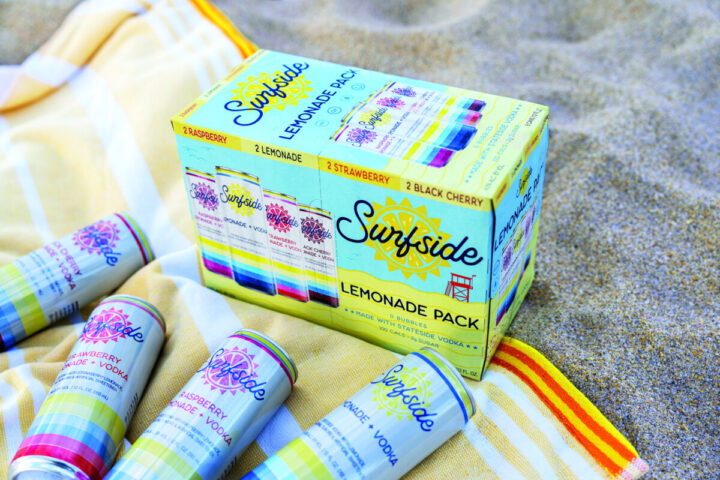
While Covid-19 wreaked havoc on so many beverage alcohol businesses, Philadelphia-based Stateside Brands owes its current good fortune to a discovery made during the lockdowns that marked the early days of the pandemic.
With just a small distillery selling vodka locally and the closure of Keystone State-controlled wine and spirits shops in early 2020, president and co-founder Matt Quigley says, “we expected we’d have to lay all our employees off even though we were deemed essential.” But CEO Clement Pappas discovered that the company could sell its Stateside vodka direct to Pennsylvania consumers, and once that news hit social media, “the phone didn’t stop ringing,” Quigley says.
Brisk DTC sales of Stateside vodka “gave us the funding to get into the RTD business,” adds Pappas. “It’s been off to the races since then.”
Indeed, Stateside Brands is the company behind one of the hottest beverage alcohol brands on the market—vodka-based Surfside RTD. Surfside ($20 a 12-pack of 12-ounce cans) surged into the No. 2 position among RTDs last year, just its third year on the market, as volume nearly tripled to more than 4.6 million (9-liter) cases from 1.2 million in 2023, according to Impact Databank. Moreover, thanks to its huge volume, Surfside, a 2024 Impact Hot Brand, jumped into the 11th position among all distilled spirits products last year, a rare feat for such a nascent brand. The Surfside portfolio includes non-carbonated iced teas, lemonades, and iced tea-lemonades, all at 4.5% abv and 100 calories a 12-ounce can.
Stateside Brands was launched by Matt Quigley, Clement Pappas, and their brothers, Bryan Quigley and Zach Pappas. The Quigley brothers, home distillers, sought to create their own vodka some ten-plus years ago. They teamed up with the Pappases—who grew up in a family juice business in southern New Jersey—and launched the company in 2016. “A couple of other investors have been involved since the beginning,” Clement says, “but we’ve never taken any outside equity.”
The past decade has been an unpredictable one for the company, with total volume surging to 5.3 million cases last year. “Every single year has had a different look, a different set of needs,” notes Matt. “Today looks wildly different from those first couple of years when there were only a few of us.” But the company’s values haven’t changed. With 240 employees today, “we still have the same mindset that every account matters to us,” Matt adds. Stateside Brands’ annual sales revenue is undisclosed.
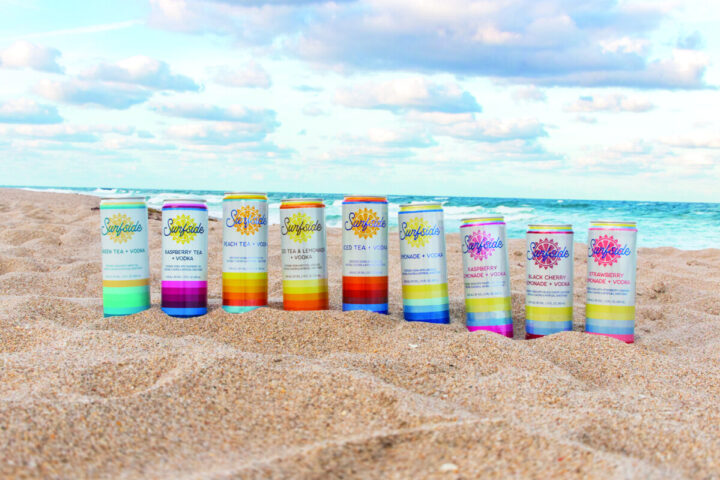
Fast Track
Introduced in 2022, Surfside’s ascension has been nothing short of remarkable for an independent brand. Seeing opportunity for a spirits-based, non-carbonated, iced tea RTD, Stateside introduced the brand into Philadelphia and New Jersey Shore accounts, where it was an immediate hit. Before long, expansion followed into other mid-Atlantic states, markets where off-premise licenses are largely restricted to independent operators. From there, growth was quick and by 2024, Surfside was available in all 50 states, including distribution in major chains like Kroger, Walmart, and Target.
Clement and Matt attribute Surfside’s phenomenal success to its brand attributes, authentic marketing, and support from a distribution network comprised of mostly beer wholesalers. “It’s a clean, easy-to-drink, non-carbonated drink in familiar flavors,” Clement says. “By being in a can, it has all of the conveniences of beer and fits all beer occasions, from tailgating, barbecuing, the beach, fishing, and ball games. Spirits products have been historically challenged in those environments.” Surfside is produced at eight co-packing facilities around the country.
Line extensions are also contributing to the brand’s popularity. A lemonade variant was introduced last summer, and earlier this year, a series of green tea line extensions was unveiled, along with a 700-ml. can ($6), dubbed “The Longboard,” which is aimed at convenience stores and stadium venues. “We’re thrilled with Surfside’s performance year-to-date,” Clement said in late April at an event. Budgeting a doubling in volume this year, the company expects to easily beat those expectations.
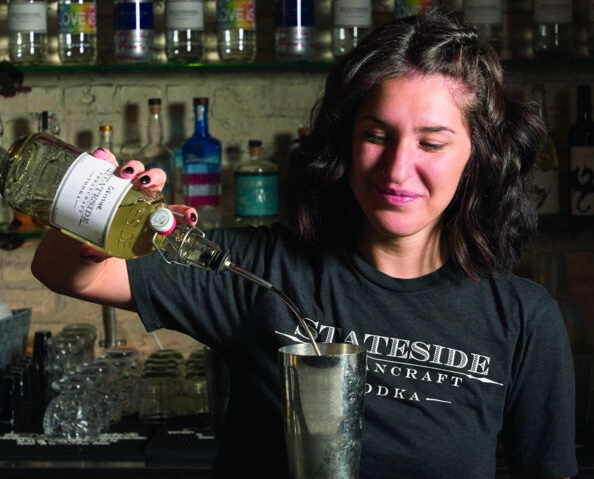
On- & Off-Premise Growth
Expansion into chain-driven states can be a challenge for brands like Surfside that are originally built in liquor stores. “We didn’t have chain relationships or much syndicated data,” Clement concedes. But thanks to great early results in markets like Florida, Virginia, and Ohio, “we were able to use that as a springboard toward national distribution.” Today, Surfside has a presence in “pretty much every national chain in the country,” as well as regional players such as Publix and Meijer, he adds.
With further gains in chains expected this year, Surfside still continues on the fast track in its core markets, with states like Pennsylvania, New Jersey, and Delaware showing gains in excess of 70% earlier this year. According to Clement, liquor stores remain the top channel for the brand, with Total Wine & More serving as its biggest retail account.
On-premise also holds a lot of potential for the brand. Already, it’s made major headway in leading chains and sports and event venues, and the channel accounts for 29% of its volume. Clement notes that Surfside is now one of just a few packaged brands mandated at Buffalo Wild Wings, along with labels like Michelob Ultra, Modelo Especial, and High Noon. He sees particular opportunity for the new large-format cans in venues. “On-premise is a big part of how we look to build awareness and drive trial,” Clement says, pointing to sampling opportunities, where legal, and tie-ins to major and local sporting events. “When we win in the on-premise, it drives the pull in the off-premise. It’s a huge focus for us.”
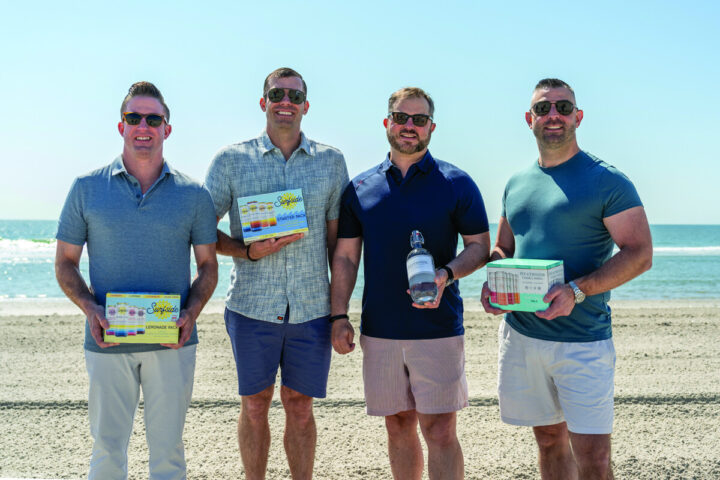
Sports Tie-Ins
The team behind Surfside looks to the Pattison Avenue area in Philadelphia, home to the Philadelphia Phillies, and the Jersey Shore as its “cultural epicenters” and brand-building models, Matt says. As such, the brand has partnerships with 12 professional teams across Major League Baseball, eight National Hockey League teams, and two National Basketball Association teams, with more expected this year. It’s also the official vodka iced tea and vodka lemonade RTD of Minor League Baseball. And in markets where there isn’t a professional baseball team, Surfside partners with a university team, such as the University of Alabama. “Sports venues are great places to drive trial but also a perfect place to drink Surfside,” says Matt. The brand also sponsors sports talk radio programming, while social media, naturally, receives a heavy investment. “Social media has been a big driver in our success and growth,” he notes.
And in an ode to the Jersey Shore, Surfside heavily leverages outdoor marketing. In addition to billboards—140 active billboards were in use this spring, according to Matt—airplane pulls masterfully promote the brand. “We’re kids who grew up on the Jersey Shore so we thought it was only natural to use that type of support,” Matt explains of the small aircraft that drag a Surfside banner across the sky. “It’s fun and gets a lot of eyes.”
He and Clement take great pride in the fact that Surfside’s marketing is all done in house. “It’s given our brand a high degree of authenticity,” Clement adds. These days, the airplane pulls roam coastal areas during the summer, along with cities hosting large sporting events.
Stateside executives are well aware of the competition in the RTD space, including the recent entry of major beverage companies with spirits-based hard teas. “It’s flattering in a way but we have to respect the competition and the excellent machines of big companies in getting products into distribution,” Clement says. But new brands from the likes of Anheuser-Busch and Boston Beer will help build the category, he believes. “As the first mover and category leader, it will be a net positive for us because it will build the salience of the category.”
While the segment is seeing a bit of a “gold rush” these days, Clement anticipates a shakeout ahead, with only two or three brands surviving. “Our job is to make sure that we’re the leader when the dust settles,” he says.
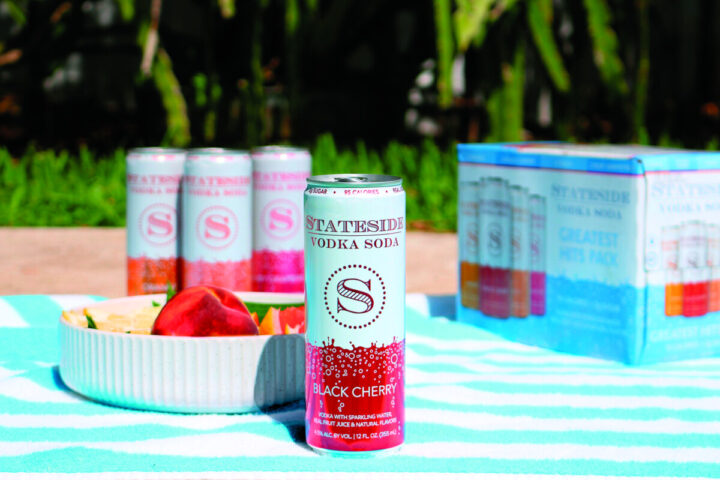
Eye On The ‘Bedrock’
Portfoliomate Stateside Vodka Sodas ($26 a 12-pack of 12-ounce cans) predate the introduction of Surfside. A line of RTDs crafted with Stateside vodka, real fruit juice, and sparkling water, the brand launched in 2021, and volume reached 605,000 cases last year, according to Impact Databank. Stateside Vodka Sodas are distributed along the mid-Atlantic, with a smattering of availability around the country. The brand is among leading carbonated RTDs in Pennsylvania, says Clement, noting that any national expansion is down the road.
Stateside vodka ($25 a 750-ml.), meanwhile, reached 36,317 cases last year, according to Impact Databank. It’s also distributed in the mid-Atlantic, along with portions of the Southeast, and further expansion is likely. “It’s the bedrock of our organization,” Clement says. While Surfside has received most of the company’s attention in recent years, “we believe there’s a great opportunity for the next great American vodka story. We’re committed to making that happen over the next three to five years.” There are no plans for expansion or branching out into new spirits, he adds.
There are also no plans to sell off Stateside Brands, Clement and Matt emphasize, despite interest from larger companies. “We’ve taken meetings with all of the big organizations of note,” Matt says. “But at this point in our life cycle, we’re not focused on selling. We’ve built something with this brand that is once in a lifetime, and it’s been too much fun to sell it off to another company.”